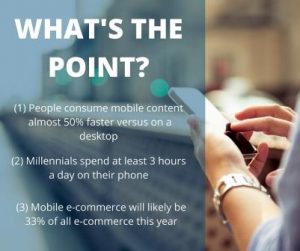We’re in for some big changes when it comes to tracking and advertising. While government regulators are making noise about taking action against major tech companies, the industry has not-so-quietly been making a couple of key changes that could lead to a cookie-less future.
Cookies are those things websites use to track you as you move around the internet. When you visit a site, it places a cookie on your computer so that it can know it’s you when your return. It’s also something advertisers use to track your movements, so they can send you ads to buy shoes after you’ve been on a shoe-shopping website.
Apple and IDFA
Apple has announced a significant change to its operating system. The change would require users to authorize identifiers for advertisers (IDFA). IDFA has been used for tracking individuals for ad targeting and was Apple’s solution for advertisers to the difficulty tracking mobile users when they were inside apps rather than inside a browser. IDFA lets advertisers optimize ad campaigns and target users that would be more receptive to their offers and cut back on advertising to uninterested users.
When launched, IDFA will now only be able to be used when it’s authorized by the user.
Google and Cookies
Google announced in January that Chrome will phase out third-party cookies by 2022. This came on the heels of an earlier announced, called the Privacy Sandbox. It’s a plan to improve the classification of cookies, give clarity and visibility to cookie settings, as well as plans to more aggressively block fingerprinting, according to Google. And now, they’ve also turned off tracking on Apple devices using Chrome.
There’s Opposition to the Movement
As you’d expect, there’s opposition for a consortium of digital marketing stakeholders. The Partnership for Responsible Addressable Media (PRAM) is taking point for the opposition.
“…recent changes announced by operating systems, browsers, and other technologies, if implemented, will significantly impact the traditional marketplace language of cookies and mobile IDs. The Partnership was created to serve as a collaborative forum for our industry to ensure addressability standards that preserve privacy, provide a consistent and effective framework for advertisers, and enrich the consumer experience.”
The moves by Apple and Google changes the game. Tracking and targeting using cookies and IDFA is one of the fundamental underpinnings for sophisticated ad delivery online. Changing the game potentially puts billions of dollars at risk for advertisers. It will make it much more difficult for advertisers to target consumers and measure the effectiveness of ad delivery.
For consumers, it means more privacy and less tracking. And, fewer cookies.
How It Might Shake Out
Although Apple has now reportedly delayed the IDFA changes until 2021, here’s how the company said it might look. Imagine if you install a new app and see a message like this:
![]()
SOURCE: Apple
What do you think you would do? Almost everyone encountering this is likely to ask the app not to track. That would put a big dent in the ability of AdTech to track individuals as they make their way around the web?—?at least for Apple for now.
“…some of the most prominent and successful companies have built their businesses by lulling their customers into complacency about their personal information. They’re gobbling up everything they can learn about you and trying to monetize it. We think that’s wrong.”
These moves could be a win for consumers who are demanding privacy. Increasingly, consumers have become more aware of privacy concerns. The majority of people in the U.S. believe they little control over data collection practices from companies or the government, according to the Pew Research Center. Nearly 60% say it would be impossible to go through daily life without having their data collected.
![]()
A significant number of people have started to take notice. A Pew Research study also shows that roughly half (52%) of those surveyed hgave decided not to use online products primarily due to privacy concerns.
However, it might also have big benefits for the two biggest platforms online: Google and Facebook. While they both benefit greatly from ad tracking, they also happen to possess more first-party data on users than almost anybody else on the planet.
Digital & Social Articles on Business 2 Community
(11)








